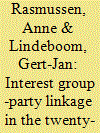| Srl | Item |
| 1 |
ID:
100843


|
|
|
|
|
| Publication |
2010.
|
| Summary/Abstract |
We restate and clarify the idea of the "cartel party," a concept that has found considerable traction in studies of parties throughout the democratic world, including those far from the original research site and data on which the cartel model was based. The cartel party thesis holds that political parties increasingly function like cartels, employing the resources of the state to limit political competition and ensure their own electoral success. The thesis has been subject to varied empirical testing and to substantial theoretical evaluation and criticism. Against this background, we look again at the cartel party thesis in order to clarify ambiguities in and misinterpretations of the original argument. We also suggest further refinements, specifications and extensions of the argument. Following a background review of the original thesis, we break it down into its core components, and then clarify the terms in which it makes sense to speak of cartelization and collusion. We then go on to explore some of the implications of the thesis for our understanding of contemporary democracies and patterns of party organization and party competition and we identify a possible agenda for future research in party scholarship.
|
|
|
|
|
|
|
|
|
|
|
|
|
|
|
|
| 2 |
ID:
120140


|
|
|
|
|
| Publication |
2013.
|
| Summary/Abstract |
This article systematically investigates interest group-party interactions in the Netherlands, Denmark and the United Kingdom based on cross-national surveys with responses from 1,225 interest groups. The findings show that interest groups and parties still interact in the beginning of the twenty-first century, but that the vast majority of their interaction involves a low degree of institutionalisation. Using fractional logit analysis, it is demonstrated that the strength of interest group-party linkage is primarily affected by systematic differences in state-society structures and organisational group characteristics. Moreover, differences are found in what conditions different types of interaction. Whereas historical legacies and partisan origin influence an interest group's structural party links, group resources make interactions of a less institutionalised, ad hoc nature more likely.
|
|
|
|
|
|
|
|
|
|
|
|
|
|
|
|